Casual conversation starts sending tractors to Africa
Shortly after graduating from South Dakota State in 2012, Mark York was working as an agronomist intern in the West African country of Burkina Faso.
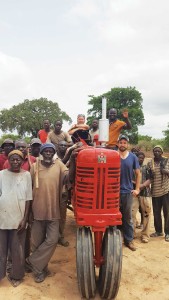
Mark York ’12 started Tractors for Africa when working as an agronomist intern in Burkina Faso. York and the nonprofit organization he created delivered one tractor in 2016 and plans to send four in 2018.
One farmer named El Haji showed York his field and explained how difficult it was to properly till, control weeds and harvest only using hand tools. York determined quickly that those tools were part of the reason why Burkina Faso’s average corn yield is just 27 bushels per acre versus 170 in the U.S. El Haji then asked York how much a tractor would cost in the U.S.
“After some questions, he asked what a really big tractor, one with 40 horsepower, would cost in the U.S.,†York recalled. “When I said $1,000 or $2,000, he said he would buy one on the spot. When I told him that shipping was expensive, he asked ‘how expensive?’ I told him I didn’t know, but I promised to find out.â€
That discussion never left York. After returning to the U.S., he took a job at Cargill and kept thinking about how to send a tractor, planter and plow to Burkina Faso. York tabled the idea until he went to coffee with co-worker Louis Ricard. After other topics, the discussion turned to shipping a tractor to Africa.
“Louis said, ‘We could do that. It’s not going to be easy, but we can get it done,’†York said.
Despite friends’ and family members’ donations, more money was needed to make the shipment. Ricard, York and fellow Cargill employee Maurice Hurst arranged a fundraising event, which added $16,000 and allowed the three to ship their first tractor, a Farmall 400, in 2016. That tractor was donated to a cooperative of farmers, and York put his SDSU agronomy degree to work analyzing the yields. By using a tractor and plow, the farmers were able to increase sorghum yields by 190 percent versus hand tillage.
“Once we were able to show the results, we knew other cooperatives would be interested,†York said, noting he worked with SDSU’s Doug Malo and David Clay to set up the study.
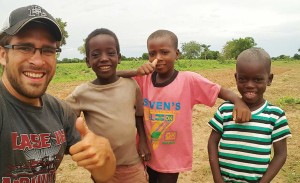 After sending the first tractor, Tractors for Africa sent another tractor in 2017 and plans on sending four tractors in 2018, if funding allows.
After sending the first tractor, Tractors for Africa sent another tractor in 2017 and plans on sending four tractors in 2018, if funding allows.
“Our long-term goal is to modernize African agriculture, and to do that, we plan to send 50 tractors in the next five years,†York said. “We need to build our fundraising efforts and add some inventory.â€
First tractor
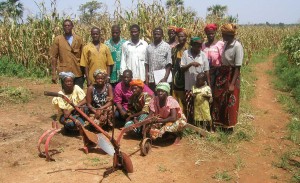 The first tractor arrived June 29, 2016. York and several community members opened the container and saw that all was intact despite worries of having the shipment stolen or held up in customs.
The first tractor arrived June 29, 2016. York and several community members opened the container and saw that all was intact despite worries of having the shipment stolen or held up in customs.
“The villagers unloaded the tractor, which was by far the most incredible experience of my life,†York said. “However, we didn’t disconnect the battery before shipping, so somewhere over the ocean, the battery was discharged. While there were more than 100 people waiting anxiously, the tractor didn’t start. We went back the second day, got the tractor started and plowed the first field. The spectators were overjoyed; adults cheered, children played in the plowed dirt, and the village chief even gave us a ram as a way of thanks.
“However, we’re not just going to give something and walk away; we want to create a long-term change,†he continued.
As part of that change, York said Tractors for Africa has set up the following model: have farmers pay a fee for plowing to cover maintenance, repairs and fuel; make sure maintenance is done on a regular schedule; and have someone on the ground every year to coach farmers on best practices.
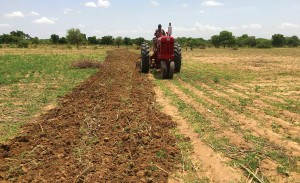 York said the next shipment is planned for March 1. The first tractor took 75 days to get from Minneapolis to Burkina Faso. The second one, 45 days.
York said the next shipment is planned for March 1. The first tractor took 75 days to get from Minneapolis to Burkina Faso. The second one, 45 days.
“Our goal is to get the tractor there before the start of the season,†York said. “If we miss that window, the value of the tractor won’t be realized until the following season.
“There’s a lot of paperwork and logistics involved. It sounds simple—get a big steel box, put it on a train or truck and then a boat to get it across an ocean and then load a truck to take the tractor to the landlocked country of Burkina Faso,†he continued. “However, we have to deal with customs agents to handle the paperwork in the other countries, pay fees, etc. We’re fortunate to have Maurice Hurst, who does shipping for a living at Cargill, on our team. Without Maurice, it would have been much more difficult.
“I think what makes Tractors for Africa work is that we have very complementary skills,†York said. “I understand agronomy but didn’t know about fundraising and shipping. Louis knows fundraising, and Maurice knows logistics.â€
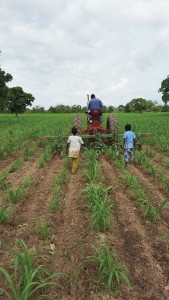 York admits the process has taught him many things since December 2014.
York admits the process has taught him many things since December 2014.
“It’s been a lot of learning; I’ve picked up a lot of life lessons along the way,†he said. “We want to create a system that works for everyone and brings people out of poverty in the long run.
“Like I said, we’re not looking for a quick exit; we are now officially a 501c3, and we expect to do this for years to come,†York continued. “My dream come true would be that Burkina Faso’s ag system is transformed; yields are doubled or tripled; they’re able to send their children to school; learn new technologies; raise corn, soybeans and cattle; export powdered milk to nearby countries … Obviously, we’re a long way from that.â€
Distinguished Professor Doug Malo, his adviser at State and the assistant department head of the Department of Agronomy, Horticulture and Plant Science, remembers York being one of his top students. However, Malo is more impressed with what York has done since graduation.
“His involvement in Tractors for Africa surprises me because most of our students look at obtaining a job, working in areas they are familiar with. It doesn’t surprise me from visiting with him that he would look at an alternative way to be helpful to others. This is his idea and his contribution. I think it’s a wonderful, wonderful project.â€
York estimates he spends 10 hours a week working with Tractors for Africa, all while working full time as an agricultural consultant with McKinsey & Company.
“I didn’t think I’d get much out of it other than satisfaction, but I’ve gained a lot of life lessons and good friends,†he said. “You never know where things will lead. Do something where you are providing value and good things will come from it.â€
Who knows where Tractors for Africa will lead? Could it be delivering 48 more tractors to Africa in four years and transforming agricultural processes on that continent? Who knows? But York is willing to put forth the effort to see it through.
– Matt Schmidt







Can I donate a tractor?